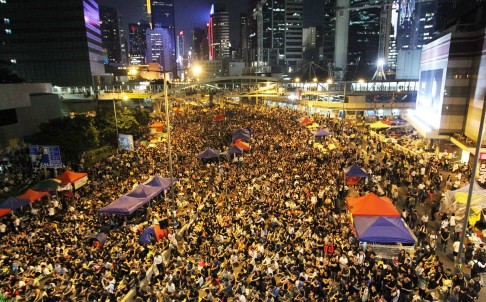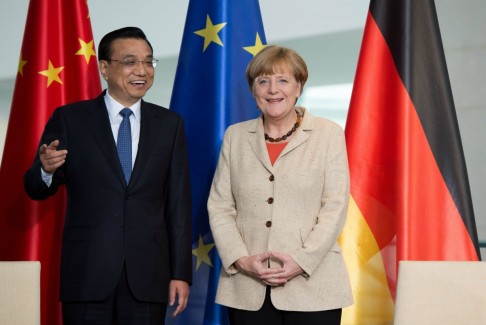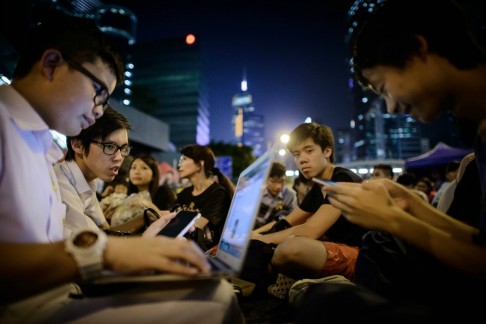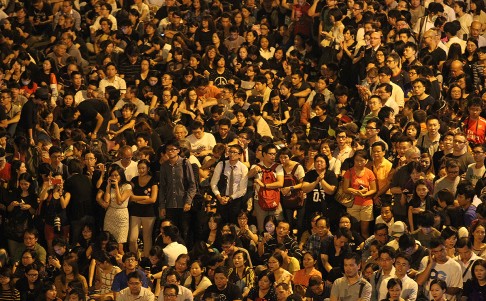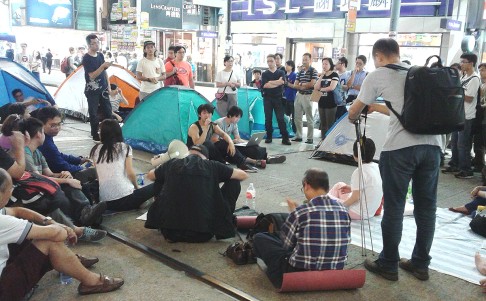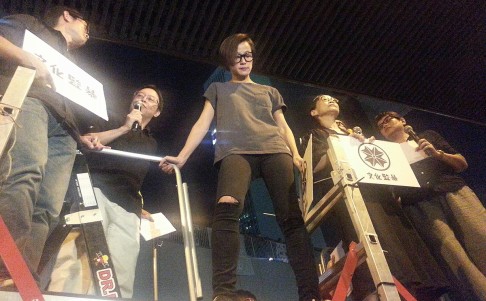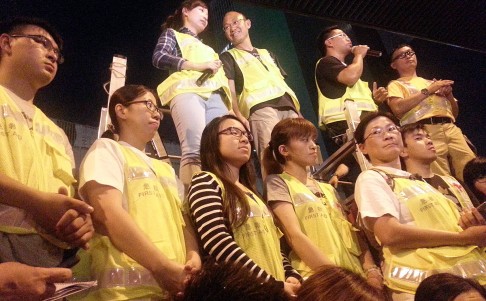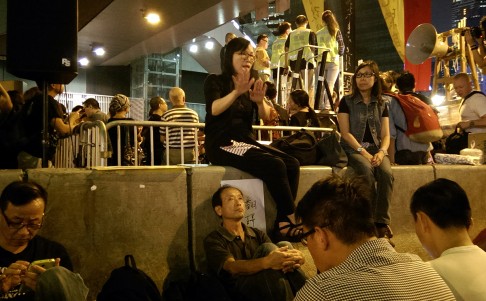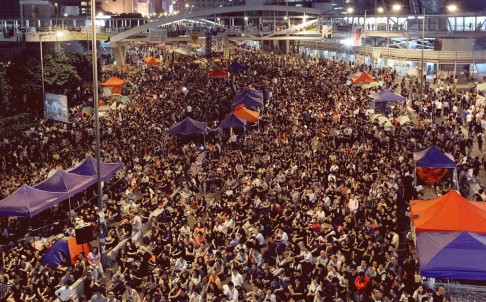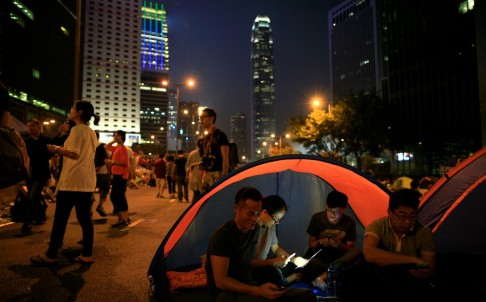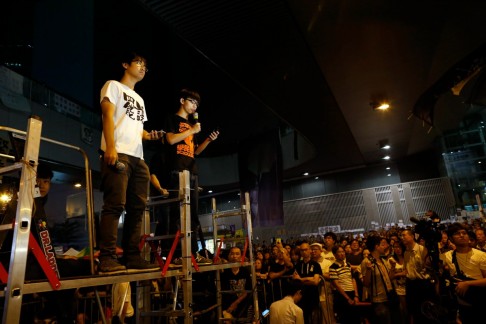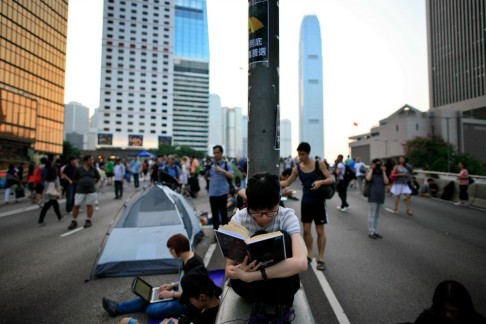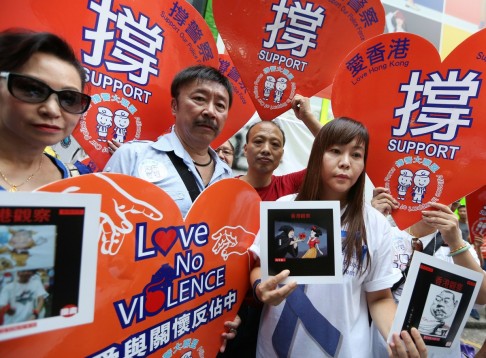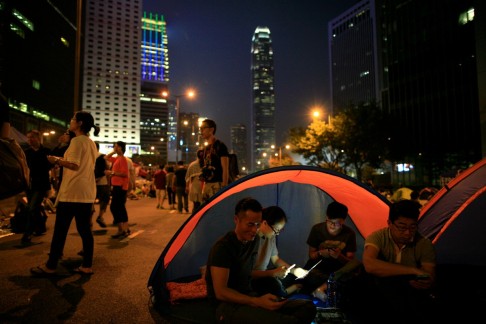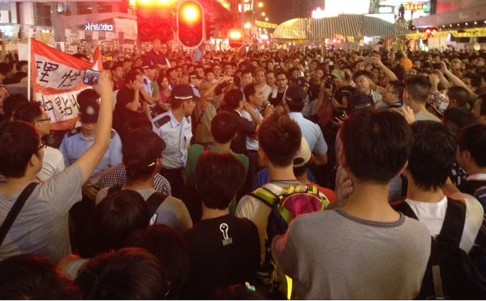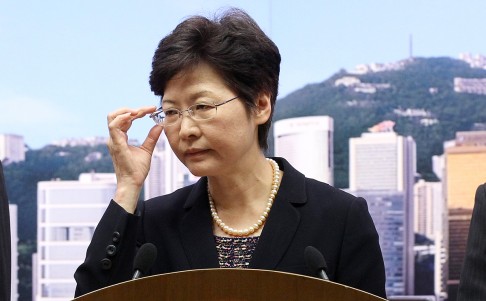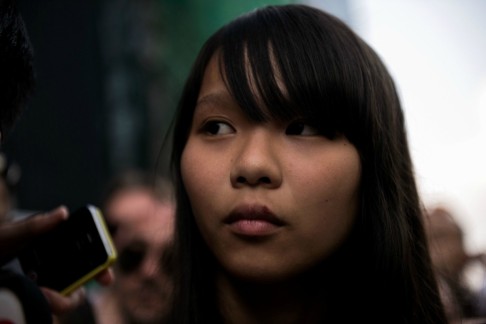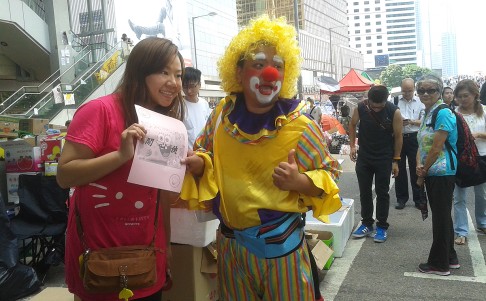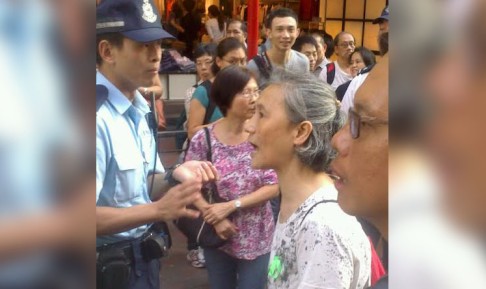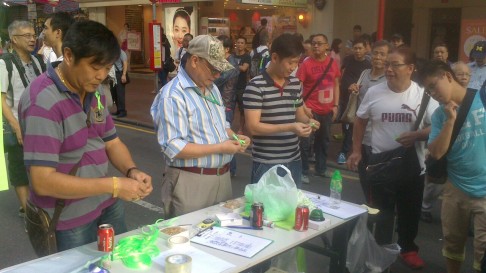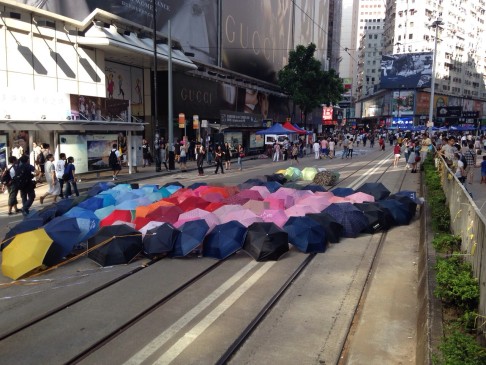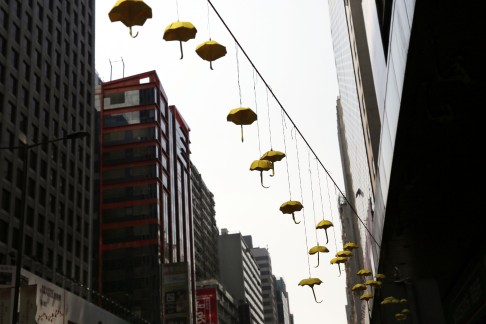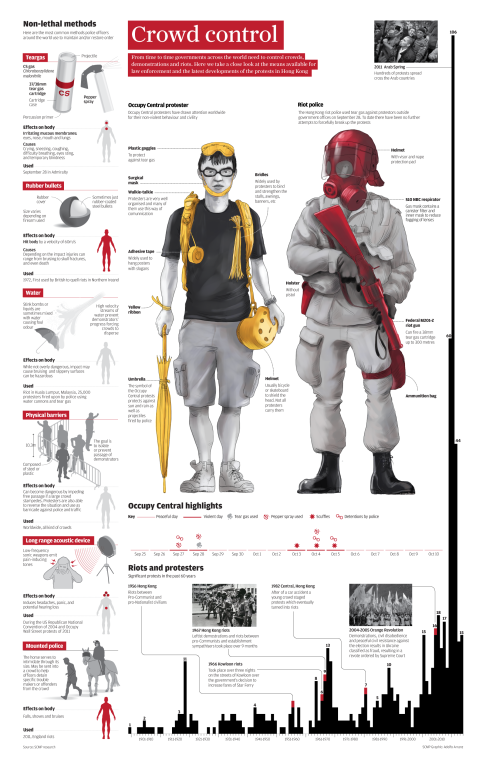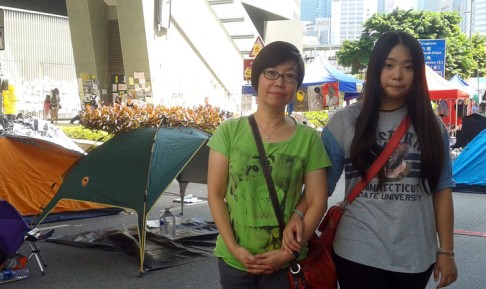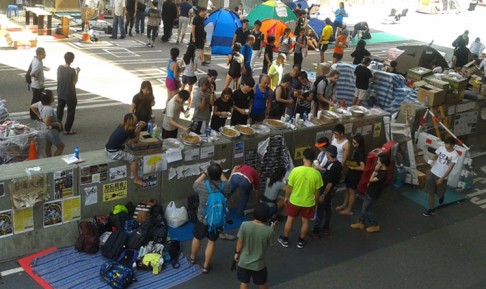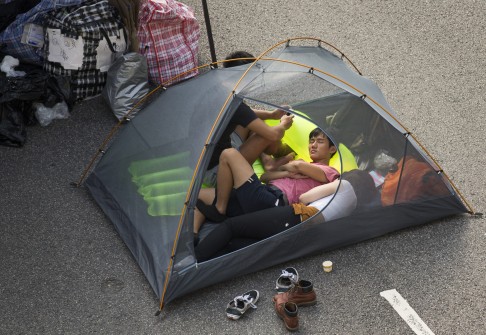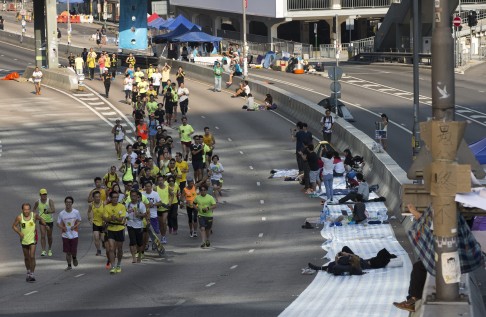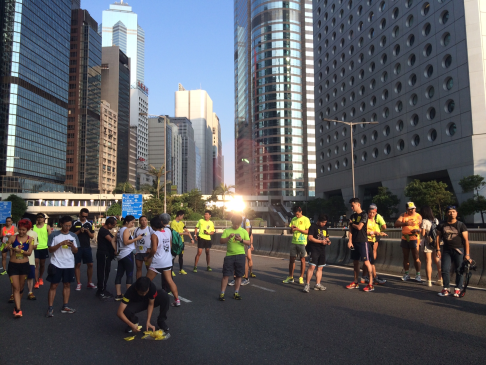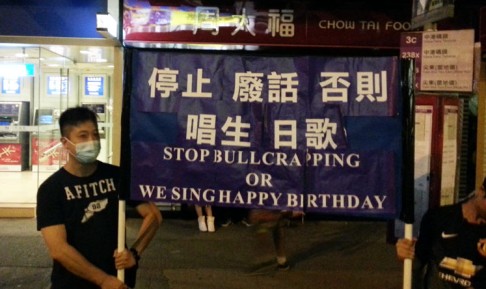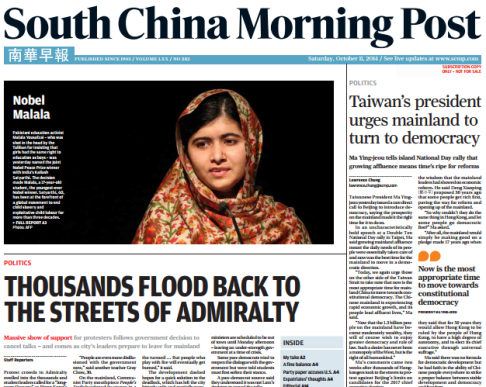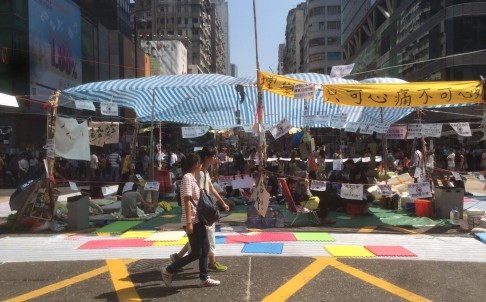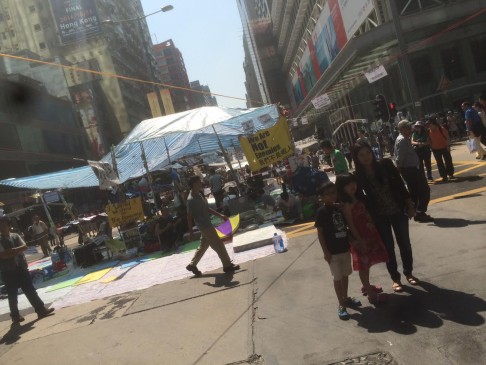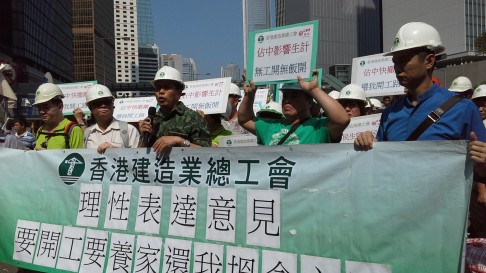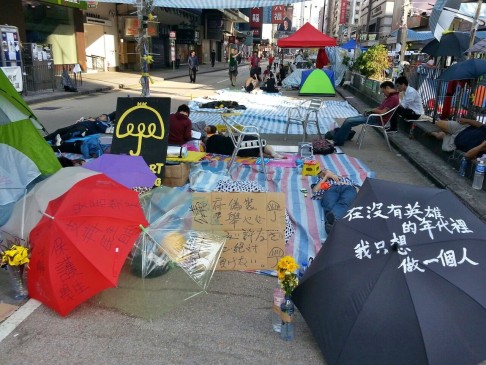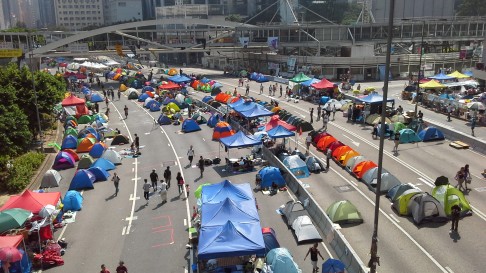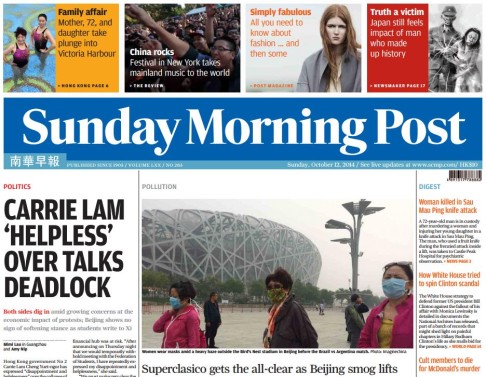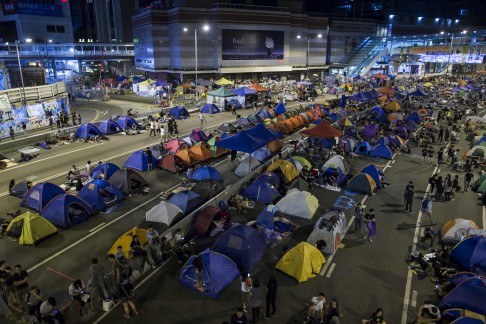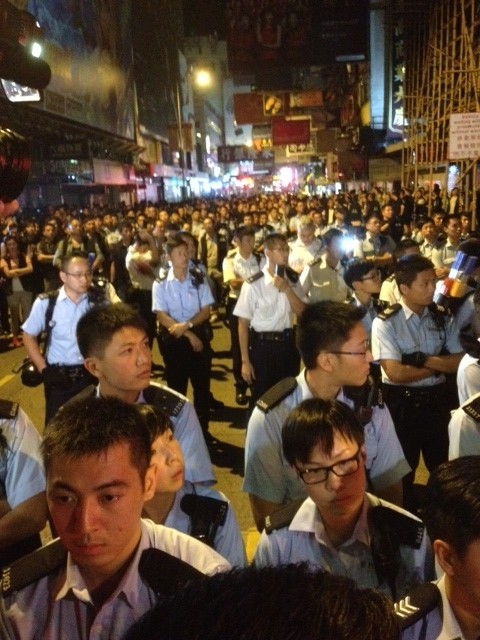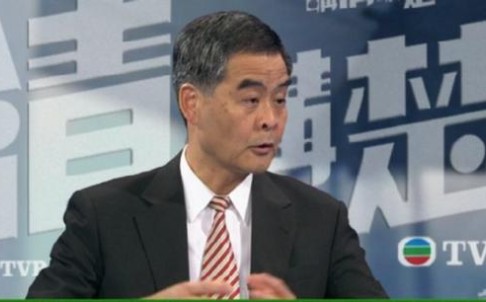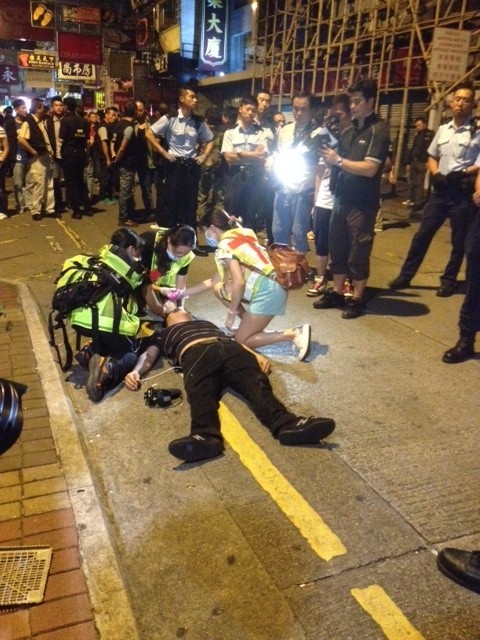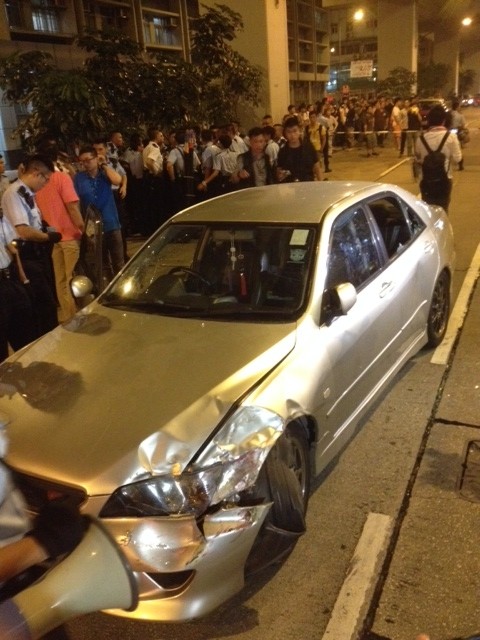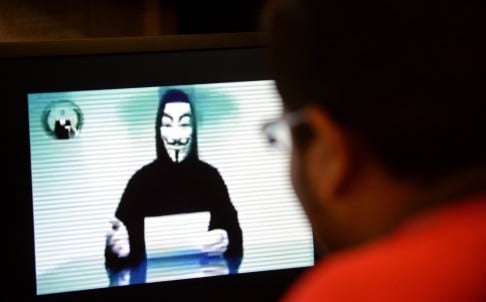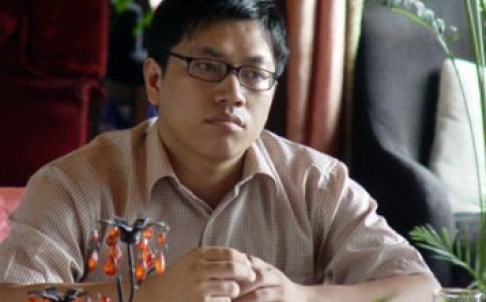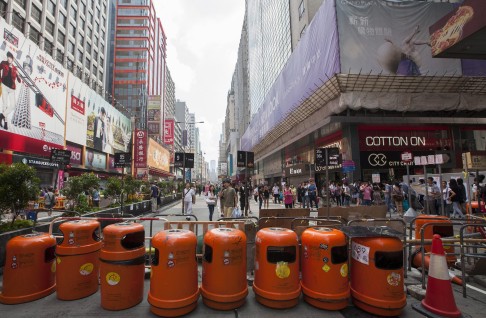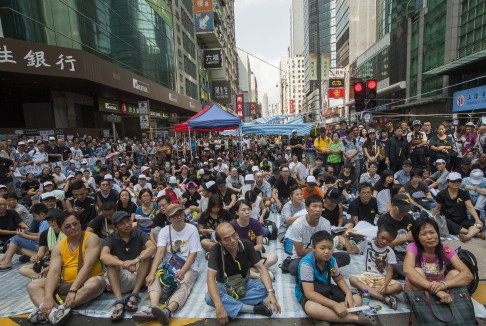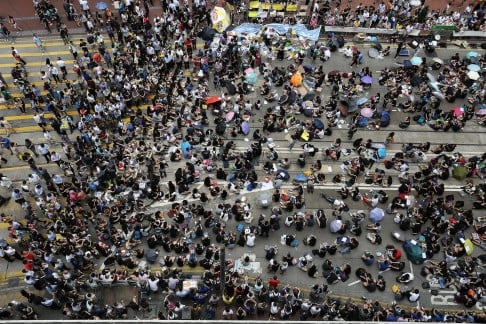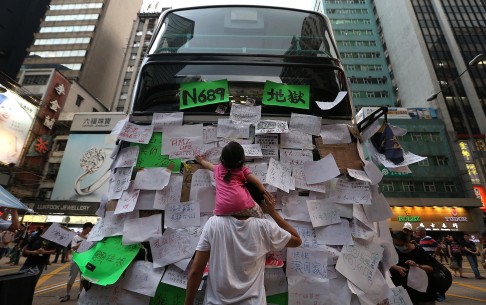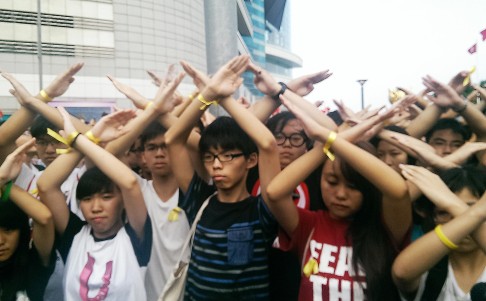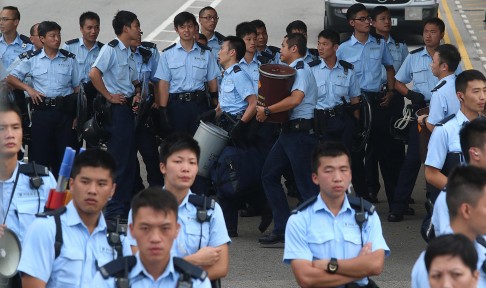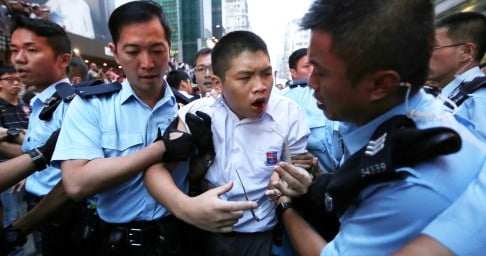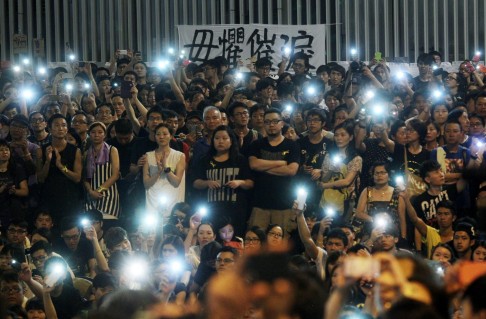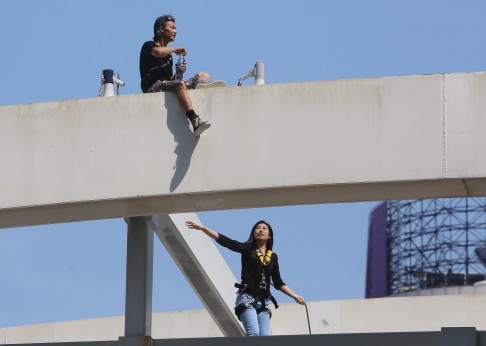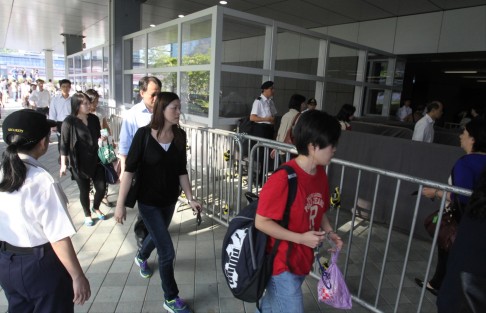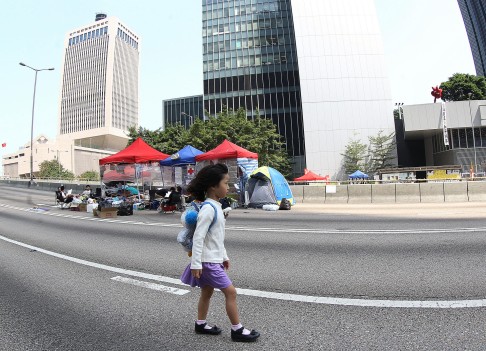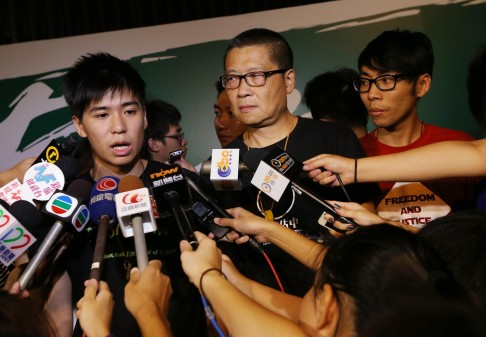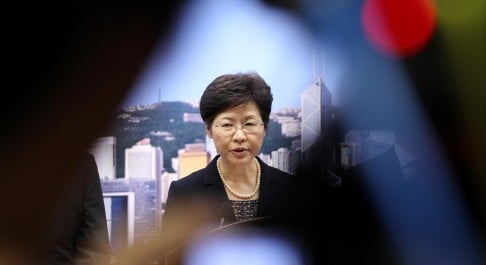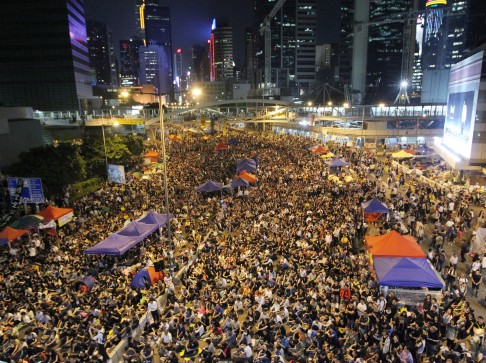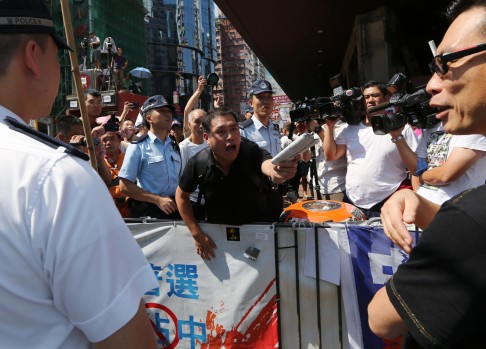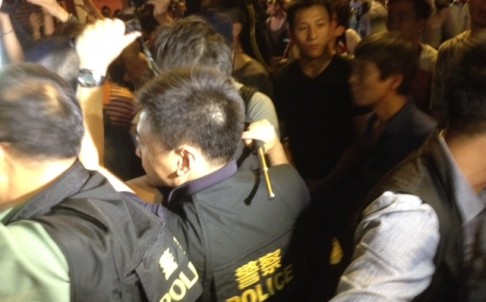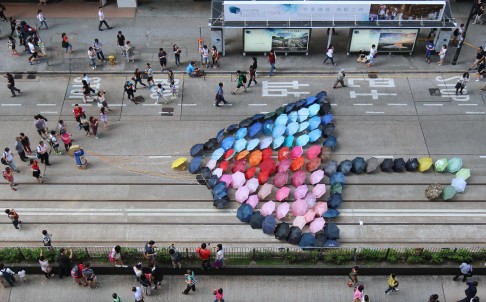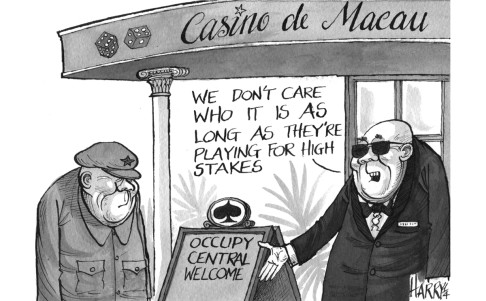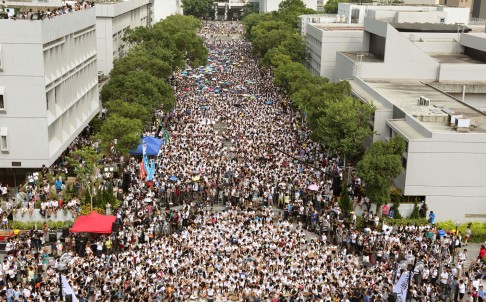Re: Give me Liberty or Give me Death! Giordano Tycoon joins Occupy Central!
LIVE: Students urge Hongkongers to occupy 'every inch of the streets' in renewed call for democracy
PUBLISHED : Friday, 10 October, 2014, 7:53am
UPDATED : Friday, 10 October, 2014, 7:54pm
Staff reporters
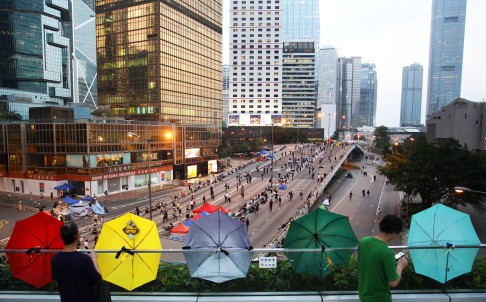
Good afternoon and welcome to our continuing coverage of the Occupy movement.
The Hong Kong government has cancelled talks with student leaders set for today, where they were supposed to discuss election reform issues as a step towards easing the current political stalemate. Chief Secretary Carrie Lam Cheng Yuet-ngor, appointed the government's representative, said the talks would not be held because the government felt they would not lead to a constructive outcome.
Student leaders have called for a mass rally in Admiralty at 7.30pm on Friday in response to Lam's announcement. Adding to government headaches, the Liaison Office in Hong Kong said its website had been targeted by hackers.
Meanwhile, Hong Kong's ICAC and police in Australia said they would launch separate investigations into a HK$50 million deal between Chief Executive Leung Chun-ying and an Australian firm.
Follow all the breaking news here.
7.55pm Admiralty: Protesters have agreed with Hong Kong Tramways to allow eight empty trams to pass through the barricades on Queensway at 3am on Saturday, under an agreement with the tram operator, a student representative says in Admiralty. The arrangement will allow normal tram services in Happy Valley to be resumed on Saturday. The representative says the decision was made to minimise inconvenience to the public.
7.43pm Causeway Bay: A projector is set for protesters to watch live broadcasts of police press conference and follow situation the rally in Admiralty. Roughly 100 people, including some onlookers, are at the Causeway Bay protest site.
7.38pm: Traffic congestion on Hong Kong Island started at around 7am this morning and lasted until after peak hours until about 10am, Lee kwok-chung, senior superintendent of traffic branch headquarters, says at a daily press briefing. Up to 16.3km of road were congested on Hong Kong Island during peak hours this morning, around 4km longer than yesterday. A traffic jam that stretched from Aberdeen to Causeway Bay was 6.3km long today, compared to 4.8km yesterday.
The city has seen 32,000 fewer cars passing three cross-harbour tunnels each day since the Occupy protests began, which represents about 10 per cent of the daily traffic flow at the tunnels. “We are concerned that traffic jams could get worse if the flow gets back to normal,” said Albert Su, assistant commissioner for transport says.
7.22pm Admiralty: Crowds gather at the protest site on Harcourt Road.
7.07pm Causeway Bay: Several people annoyed by the ongoing occupation of Causeway Bay are having a heated debate with protesters. “If you want to Occupy Central, go to Admiralty. Not here. We can’t go back to work,” one woman shouts at protesters. A business owner in the area approaches the crowd saying: “Although my business is affected by the protests, I support you. I really support you,” the man says before disappearing into the crowd.
6.48pm Admiralty: A steward from the Occupy camp in Tamar was allegedly assaulted by two men in Admiralty MTR station at around 5.30pm. One of the suspects was surrounded by police and apprehended while the other managed to flee the scene. About 20 police officers are currently investigating the incident which took place near Exit A.
6.37pm: More than 140 scholars from the city’s universities and tertiary educational institutes have signed a petition, asking the government to resume an “open and honest” dialogue with students over political reform. Dr Dixon Sing Ming, one of the co-ordinators of the petition, says the petition had received overwhelming support since its drafting this morning.
The petition also condemns the police’s use of excessive force to suppress peaceful demonstrations. “We are also disappointed with the government's resorting to excuses to avoid dialogue with student leaders ... We condemn the government’s lack of good will, and its unwillingness to deal with the crisis through genuine dialogue,” said Dr Choy Po-king of the Chinese University.
Meanwhile, tram operator Hong Kong Tramways has reached a preliminary agreement with Occupy protesters to temporarily reopen the tramway from Admiralty to its Whitty Street Depot to allow trams to return to Happy Valley. Albert Su, assistant commissioner for transport, tells a press briefing the tram service at Happy Valley will fully resume as soon as an agreement can be reached with protesters.
6.19pm Causeway Bay: Volunteers are setting up tents at the protest site as evening falls. Volunteer Tom Leung says eight tents had been donated by anonymous Occupy supporters. “Tents are really needed for people who stay here overnight, especially as the weather gets cooler.”
Ng Yuen Mei, another volunteer, sets up a projector to air a film about soaring rents in Kwun Tong industrial buildings.” I have to do something to draw people’s attention to this. But more importantly, I want to raise people’s awareness about social issues.”
Ng says she will continue protesting until the very end. “Freedom is not free. We have to fight for it, and pay for it. This protest is for Hong Kong and for a better future,” said Ng. “It’s an awakening. It’s sort of a wake-up call to everybody. It’s helped make people care more about social issues.”
5.51pm Legco: Legco's house committee endorses Jeffrey Lam's proposal to launch a probe into the Occupy Central protests, including its organisation and funding. The proposal is endorsed by 35 pro-government lawmakers, while 25 pan-democrats oppose it. However, it is likely that the proposal will be voted down when it seeks the full council's final approval on October 29. According to Legco rules, it requires majority support in both the functional group as well as the geographical group to approve a lawmaker's motion. The pan-democrats hold a majority in the geographical constituencies.
5.34pm: Following a statement issued recently by the Hong Kong Bar Association, the head of another legal advisory body has also weighed in on debate over the current political turmoil. Chairman of the Basic Law Institute Alan Hoo SC slammed the government on Friday for lacking the courage to take responsibility for the unfolding situation.
Hoo said the current discontent stemmed from the government’s failure to explain to the public what arrangements could be further discussed within the current legal framework. He said the public should be informed that the current proposal was not mandatory, and that if they disagreed with it, it could be “spent”.
Allowing it to be defected in the Legislative Council, he said, is one way, though not the most ideal. The other way would be for the government to inform the National People’s Congress that it would like to withdraw its application for the reform.
“I don’t see the Hong Kong government having the courage to do that,” he added.
“It has now descended into a political grappling match with the students, largely depending on which side has more chips to bargain with,” Hoo said. But this had put Hong Kong’s reputation as an international financial hub on the line as well as causing the local economy to “haemorrhage”, he added.
Hoo proposed that the government should start estimating the economic losses on a daily basis, and set aside funds to help those in need. “If Hongkongers suffer from calamity, be it a natural one or one that’s caused by people, the government should look after those being affected,” he said.
On clearing the streets, he said the government should restore its execution of the law. While heavy-handed tactics are not recommended, Hoo said the government should spell out conditions for amnesty. After that, police should set up checkpoints outside protest sites, and prosecute protesters as they leave.
Hoo said he was not against the civil disobedience movement, but noted that protesters “needed to bear the legal consequences [of their actions].”
5.11pm Legco: Lawmakers are still debating pro-government lawmaker Jeffrey Lam Kin-fung's proposal to invoke the legislature's special powers to probe the Occupy Central protests, its organisation and financial sources.
Pan-democrats are strongly against the idea, slamming the pro-government camp for trying to abuse their power and create "white terror".
Civic Party leader Alan Leong says: "I know this legislature has been ignoring its rules, but I didn't know that it has been ignoring them to this extent. The Basic Law's Article 73 clearly states the lawmakers' duties, I want to ask Lam: Which duties are you talking about?"
Labour Party chairman Lee Cheuk-yan asks whether the pro-government camp want to use the probe as a way to gather information for national security authorities.
Given the pro-government camp's majority, Lam's proposal is likely to be approved by the committee. But the full council has to vote on the matter again in the future to endorse the committee's approval.
4.52pm: Nothing says love like Occupy! A bride and groom, in formal attire, drew a crowd on Connaught Road in Admiralty when they decided to have a wedding march through the protest site. The newlyweds got cheers and well-wishes from protesters as they passed, then stopped for photos before leaving 10 minutes later.
The couple, who have lived in Hong Kong for three years and work in insurance, tied the knot at the French consulate in Admiralty Centre this afternoon. They wanted to take pictures in Wan Chai, but the roads were blocked, so made the last-minute decision to head to Connaught.
Asked if they supported Occupy, the groom Adrien said that was not their intent. Their common friend, Glady Wong, added that the couple wanted to capture a historic moment on their special day.
It's not the first time that weddings have featured in the protests. On day seven of the civil disobedience movement, Yau Chi-hang, 22, got on his knees in the middle of the Mong Kok protest site and proposed to his sweetheart Crystal Chan.
And earlier that week, a couple in their 30s capped off their big day by taking wedding snaps with the Wan Chai protests as their backdrop.
4.40pm: It seems Hong Kong's top leaders won't be in town this weekend. Chief Secretary Carrie Lam Cheng Yuet-ngor heads to Guangzhou tomorrow to attend a forum and trade fair jointly organised by Hong Kong, Guangdong and Macau.
Chief Executive Leung Chun-ying will also travel there on Sunday to attend a conference with leaders of Macau and the Pearl River Delta provinces.
Commerce Secretary Gregory So Kam-leung, development chief Paul Chan Mo-por, and Constitutional and Mainland Affairs Secretary Raymond Tam Chi-yuen will also join the trade fair and forum.
Lam is expected back on Sunday, while the rest will return on Monday afternoon.
4.30pm: Asked if retreating from some occupied areas was a possibility, Federation of Students secretary Alex Chow said this would only be considered if the administration gives concessions.
"If the government is wiling to offer [a reopening] of Civic Square, we will discuss with other occupiers whether it [a retreat] is possible and if they agree with that," Chow said. Civic Square is the forecourt of the government headquarters and a previous site of protests.
Chow said he was optimistic about the civil disobedience movement lasting for a long time, as "further procrastination of dialogues would force more people" to come out to the streets.
4pm: The Legislative Council's House Committee has approved requests by lawmakers - four pan-democrats and one pro-government - to raise urgent questions about the Occupy Central protests during Legco's first council meeting on Wednesday.
The committee is debating another request to launch an investigation on the matter. (See further information below)
During next Wednesday's meeting, Civic Party leader Alan Leong will also table an adjournment motion to debate the government's and the police's handling of the protests.
Chief Executive Leung Chun-ying will attend a regular question-and-answer session at Legco on Thursday. He is expected to be grilled on political reform and protest issues.
3.35pm: Wan Chai District councillors have asked protesters in Causeway Bay to remove the blockades so that trams could run in the area again.
The councillors, including Stephen Ng Kam-chun and Yolanda Ng, spoke to volunteer Danny Yau, who replied that he was not responsible for the area. Occupy protesters have stressed they are leaderless.
But Yau, a recent graduate, later said the barricades could be removed if the government takes their demands more seriously. “We can only do this if they ... take [our requests] seriously,” he said.
Ng told the Post about the councillors' concern: "Mostly the disabled and elderly take the tram. The blockade has brought inconvenience to their lives. We hope they can open them."
During the conversation between councillors and protesters, a woman interrupted, shouting that the protests had inconvenienced the public, especially the elderly.
Minutes later, a commotion broke out as several others began shouting at the demonstrators that the protests are illegal.
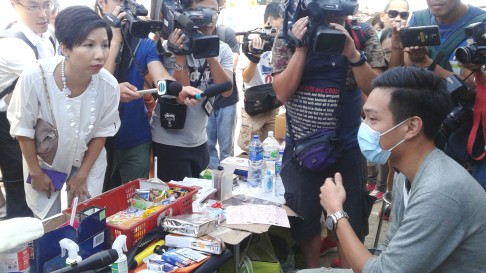
Wan Chai District Councillor Yolanda Ng speaks to a volunteer about letting trams through. Photo: Kathy Gao
3.20pm: The Federation of Students warned the government that they would “escalate” their action if officials refused to come to the negotiating table with acceptable terms.
Federation secretary Alex Chow Yong-kang, appearing in a press conference with other protest leaders, said: “If they do not give us a just and reasonable answer to all the occupiers, there is no reason to persuade people from retreating.
"If the government keeps denying the meeting, we could see that one of the options is to block the government building again.”
Scholarism's Joshua Wong and Occupy Central co-founder Benny Tai reiterated calls for the public to gather on Harcourt Road and around the government headquarters in Admiralty.
Chow said adjustments would be made if the government shows genuine, good intentions. "It really depends on the terms and conditions offered by the government for us to adjust the meaning and strategic locations of our occupying movement," Chow said.
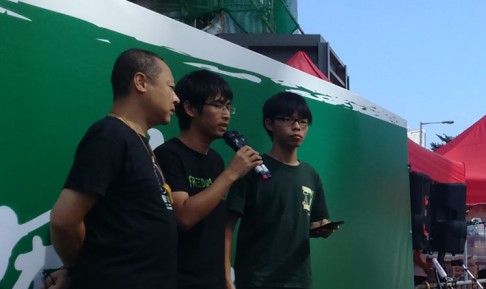
Protest leaders give a press conference. Photo: Elizabeth Cheung
3pm: Five government advisers working on environment policy quit today to protest both CY Leung's and the police's response to Occupy.
Environmental Campaign Committee member Lam Tsz-ching; Food Wise Hong Kong steering committee member Leila Chan; and Lo Sze-ping, a member of the Strategy Subcommittee of the Council for Sustainable Development tendered their resignations. Hahn Chu Hon-keung and Katty Law Ngar-ning, members of the council's support group on municipal solid waste charging, also quit.
They said their resignations were part of the “non-cooperation movement”, launched by pan-democrats in the legislature to put pressure on the government on the suffrage issue.
“We don’t know what effects the resignation may bring about. But we are sure nothing can be achieved by being an onlooker,” Chu said.
At least three other advisers - including Francis Ngai Wah-sing, an associate member of the Central Policy Unit - had resigned a day after tear gas was used to disperse protesters in Admiralty on September 28.
2.50pm: The Legislative Council's House Committee said it would debate requests from various lawmakers to look into the Occupy movement.
Four pan-democrats wanted to raise urgent questions on the issue of the police's handling of the protests, while independent pan-democrat Wong Yuk-man wants to invoke Legco's special power to launch an investigation, especially on the alleged triad attacks on protesters in Mong Kok.
Countering the pan-democrats' moves, pro-government lawmaker Jeffrey Lam Kin-fung requested a probe into the Occupy movement as a whole, including its financial sources, while Tam Yiu-chung, chairman of the DAB party, wanted to raise an urgent question on the matter.
2.37pm: An angry man caused a commotion today, blaming protesters for having too much of a ball at the Mong Kok protest site last night. The man said he was incensed by the now-viral photos of people playing ping-pong and enjoying hotpot on the streets.
"What is democracy? Have you ever seen protesters in other countries playing table tennis and having hotpot when they fight for democracy?" he yelled as onlookers stopped to watch.
He scolded the demonstrators for turning Mong Kok into a personal playground at the expense of citizens' right to use the roads.
Police officers led the man away after protesters urged him to calm down. The ping-pong table had already been removed from the site.
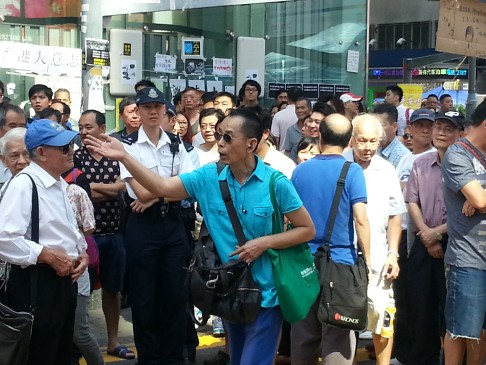
A man confronts protesters over pictures of several participants enjoying hot pot and table tennis in the Nathan Road camp. Photo: Thomas Chan
2.20pm: What do protesters think about the called-off dialogue with Carrie Lam? Here is what people are telling SCMP reporters in the streets:
Lau Kwong-kit, 60: “I think the government found that no consensus could be made even [in a] dialogue with the students, therefore they simply cancelled the meeting.
"Anyway, the [Occupy] movement leaders cannot control the guards at the barricades, so the government does not want to talk … There is a division among the protesters. See how Cardinal Zen scolded the students?” he said, referring to Zen's statement yesterday that it would be ill-advised to continue the protests when faced with an unrelenting government.
Shen So-han, 20, university student: “It is impossible that the government wants us to cooperate without any conditions. Carrie Lam’s argument of criticising the [pan-democrat lawmakers'] non-cooperative movement as damaging the dialogue's foundation is reversing the most and least important priorities."
Ryo Wong, 28: “I can tell the government simply wanted to procrastinate when they hadn't decided on the location of dialogue even a day before [the scheduled meeting]. I hope the movement can be escalated and more people can be summoned to the protest."
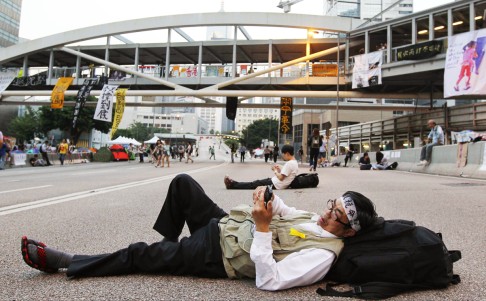
A protester rests on the road in Admiralty. Photo: Edward Wong
1.53pm: Hong Kong actor Jackie Chan has spoken out about the protests, calling for a "return to reason", and expressed anxiousness at economic losses reportedly caused by the civil disobedience movement.
Everyone involved must "work together, return to reason, face the future, love the country, love our Hong Kong", Chan said on his Weibo account on Thursday.
“I read the news that economic losses in Hong Kong are up to 350 billion,” Chan wrote, without citing the currency or a specific news report. “This makes me really anxious. I believe that all Hong Kong people love Hong Kong.”
Chan also quoted a line in the song Nation: “Can there be a prosperous home without a powerful country?” He recorded the track with singer Liu Yuanyuan in 2009 to celebrate the 60th anniversary of the founding of the People’s Republic of China.
Many have awaited Chan's response to the Occupy protest as he once caused a stir for calling Hong Kong a "city of protest" where the right to demonstrate should be limited. A recent report by the British government had put expected losses at HK$6.69 billion if the protests last for a month.
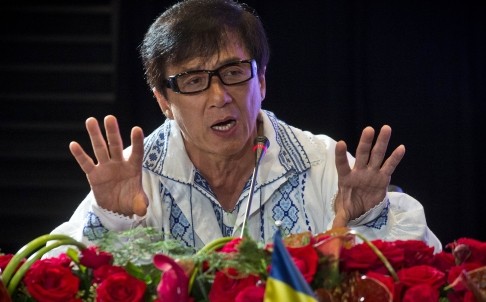
International martial arts star Jackie Chan. Photo: AFP
1.30pm: Protest groups at the forefront of the civil disobedience movement announced they would hold a press conference at 2pm regarding tonight's action.
12.55pm: A man accused of taking upskirt photos of an Occupy volunteer was escorted away by police in Mong Kok.
Protesters alleged the man had been taking photos at the site since this morning - including inappropriate shots of the female volunteer. A police officer said they would examine the photos on the man's camera.
12.32pm: For lunch in Admiralty, volunteers are distributing free food and drinks to protesters, including hot dogs, buns and egg tarts. A drinks stall has also been providing coffee, vanilla Japanese green tea and aloe vera-mandarin-honey drinks.
In Mong Kok, people with varying political views have formed circles to exchange their views on topics such as the impact of Occupy on society, communism and the meaning of democracy. The talks are spirited but peaceful. Few police officers are standing by to monitor the goings-on.
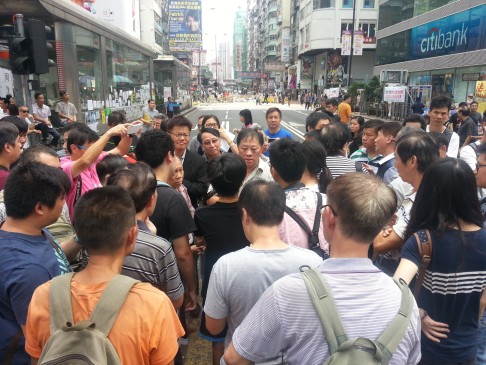
People gather for a political discussion in Mong Kok. Topics include the future of Occupy, communism and democracy. Photo: Timmy Sung
12.15pm: A man dressed in a Gurkha uniform, worn by Nepalese troops, who was directing traffic away from a barricade in Admiralty attracted many curious looks this morning.
The man, Ewin Cheng, a 35-year-old Occupy volunteer, told the Post his costume had no political meaning and that he was just a military uniform enthusiast.
"Even going to work, I would wear trousers or tops with camouflage elements," said Chen, who works in advertising and freelance features reporting. A Gurkha brigade had decades ago been stationed in Hong Kong under the British.
Asked if he was making a fashion statement, Cheng said: “These kinds of clothes are cheap and practical … I do not think 'coolness' is the major factor for me."
Only fire trucks, ambulances and delivery trucks servicing shops nearby are allowed by protesters to pass through the barricade on Queensway. This morning, Cheng and other volunteer guards had to bar a woman driver from passing through. "I do not know an alternative route! Are you going to take me back home?" the woman shouted. The guards later suggested she take Lung Wo Road.
Chen said guarding the barricades was a difficult task - one that involves getting cursed at by angry and upset drivers. “Many people do not understand why we are blocking the road. In fact, we just hope to pressure the government and let them know what the students’ needs are precisely,” he said.
“While the drivers are asking to reopen the road for them, we also hope the government can open a path for the young people too.”
Cheng, who also volunteered for the radical democratic People Power party for five years, said he hoped the government could resume a dialogue with the people. And as for his own ride home, Cheng makes his way on a bike - also decked out in camouflage.
LIVE: Students urge Hongkongers to occupy 'every inch of the streets' in renewed call for democracy
PUBLISHED : Friday, 10 October, 2014, 7:53am
UPDATED : Friday, 10 October, 2014, 7:54pm
Staff reporters

Good afternoon and welcome to our continuing coverage of the Occupy movement.
The Hong Kong government has cancelled talks with student leaders set for today, where they were supposed to discuss election reform issues as a step towards easing the current political stalemate. Chief Secretary Carrie Lam Cheng Yuet-ngor, appointed the government's representative, said the talks would not be held because the government felt they would not lead to a constructive outcome.
Student leaders have called for a mass rally in Admiralty at 7.30pm on Friday in response to Lam's announcement. Adding to government headaches, the Liaison Office in Hong Kong said its website had been targeted by hackers.
Meanwhile, Hong Kong's ICAC and police in Australia said they would launch separate investigations into a HK$50 million deal between Chief Executive Leung Chun-ying and an Australian firm.
Follow all the breaking news here.
7.55pm Admiralty: Protesters have agreed with Hong Kong Tramways to allow eight empty trams to pass through the barricades on Queensway at 3am on Saturday, under an agreement with the tram operator, a student representative says in Admiralty. The arrangement will allow normal tram services in Happy Valley to be resumed on Saturday. The representative says the decision was made to minimise inconvenience to the public.
7.43pm Causeway Bay: A projector is set for protesters to watch live broadcasts of police press conference and follow situation the rally in Admiralty. Roughly 100 people, including some onlookers, are at the Causeway Bay protest site.
7.38pm: Traffic congestion on Hong Kong Island started at around 7am this morning and lasted until after peak hours until about 10am, Lee kwok-chung, senior superintendent of traffic branch headquarters, says at a daily press briefing. Up to 16.3km of road were congested on Hong Kong Island during peak hours this morning, around 4km longer than yesterday. A traffic jam that stretched from Aberdeen to Causeway Bay was 6.3km long today, compared to 4.8km yesterday.
The city has seen 32,000 fewer cars passing three cross-harbour tunnels each day since the Occupy protests began, which represents about 10 per cent of the daily traffic flow at the tunnels. “We are concerned that traffic jams could get worse if the flow gets back to normal,” said Albert Su, assistant commissioner for transport says.
7.22pm Admiralty: Crowds gather at the protest site on Harcourt Road.
7.07pm Causeway Bay: Several people annoyed by the ongoing occupation of Causeway Bay are having a heated debate with protesters. “If you want to Occupy Central, go to Admiralty. Not here. We can’t go back to work,” one woman shouts at protesters. A business owner in the area approaches the crowd saying: “Although my business is affected by the protests, I support you. I really support you,” the man says before disappearing into the crowd.
6.48pm Admiralty: A steward from the Occupy camp in Tamar was allegedly assaulted by two men in Admiralty MTR station at around 5.30pm. One of the suspects was surrounded by police and apprehended while the other managed to flee the scene. About 20 police officers are currently investigating the incident which took place near Exit A.
6.37pm: More than 140 scholars from the city’s universities and tertiary educational institutes have signed a petition, asking the government to resume an “open and honest” dialogue with students over political reform. Dr Dixon Sing Ming, one of the co-ordinators of the petition, says the petition had received overwhelming support since its drafting this morning.
The petition also condemns the police’s use of excessive force to suppress peaceful demonstrations. “We are also disappointed with the government's resorting to excuses to avoid dialogue with student leaders ... We condemn the government’s lack of good will, and its unwillingness to deal with the crisis through genuine dialogue,” said Dr Choy Po-king of the Chinese University.
Meanwhile, tram operator Hong Kong Tramways has reached a preliminary agreement with Occupy protesters to temporarily reopen the tramway from Admiralty to its Whitty Street Depot to allow trams to return to Happy Valley. Albert Su, assistant commissioner for transport, tells a press briefing the tram service at Happy Valley will fully resume as soon as an agreement can be reached with protesters.
6.19pm Causeway Bay: Volunteers are setting up tents at the protest site as evening falls. Volunteer Tom Leung says eight tents had been donated by anonymous Occupy supporters. “Tents are really needed for people who stay here overnight, especially as the weather gets cooler.”
Ng Yuen Mei, another volunteer, sets up a projector to air a film about soaring rents in Kwun Tong industrial buildings.” I have to do something to draw people’s attention to this. But more importantly, I want to raise people’s awareness about social issues.”
Ng says she will continue protesting until the very end. “Freedom is not free. We have to fight for it, and pay for it. This protest is for Hong Kong and for a better future,” said Ng. “It’s an awakening. It’s sort of a wake-up call to everybody. It’s helped make people care more about social issues.”
5.51pm Legco: Legco's house committee endorses Jeffrey Lam's proposal to launch a probe into the Occupy Central protests, including its organisation and funding. The proposal is endorsed by 35 pro-government lawmakers, while 25 pan-democrats oppose it. However, it is likely that the proposal will be voted down when it seeks the full council's final approval on October 29. According to Legco rules, it requires majority support in both the functional group as well as the geographical group to approve a lawmaker's motion. The pan-democrats hold a majority in the geographical constituencies.
5.34pm: Following a statement issued recently by the Hong Kong Bar Association, the head of another legal advisory body has also weighed in on debate over the current political turmoil. Chairman of the Basic Law Institute Alan Hoo SC slammed the government on Friday for lacking the courage to take responsibility for the unfolding situation.
Hoo said the current discontent stemmed from the government’s failure to explain to the public what arrangements could be further discussed within the current legal framework. He said the public should be informed that the current proposal was not mandatory, and that if they disagreed with it, it could be “spent”.
Allowing it to be defected in the Legislative Council, he said, is one way, though not the most ideal. The other way would be for the government to inform the National People’s Congress that it would like to withdraw its application for the reform.
“I don’t see the Hong Kong government having the courage to do that,” he added.
“It has now descended into a political grappling match with the students, largely depending on which side has more chips to bargain with,” Hoo said. But this had put Hong Kong’s reputation as an international financial hub on the line as well as causing the local economy to “haemorrhage”, he added.
Hoo proposed that the government should start estimating the economic losses on a daily basis, and set aside funds to help those in need. “If Hongkongers suffer from calamity, be it a natural one or one that’s caused by people, the government should look after those being affected,” he said.
On clearing the streets, he said the government should restore its execution of the law. While heavy-handed tactics are not recommended, Hoo said the government should spell out conditions for amnesty. After that, police should set up checkpoints outside protest sites, and prosecute protesters as they leave.
Hoo said he was not against the civil disobedience movement, but noted that protesters “needed to bear the legal consequences [of their actions].”
5.11pm Legco: Lawmakers are still debating pro-government lawmaker Jeffrey Lam Kin-fung's proposal to invoke the legislature's special powers to probe the Occupy Central protests, its organisation and financial sources.
Pan-democrats are strongly against the idea, slamming the pro-government camp for trying to abuse their power and create "white terror".
Civic Party leader Alan Leong says: "I know this legislature has been ignoring its rules, but I didn't know that it has been ignoring them to this extent. The Basic Law's Article 73 clearly states the lawmakers' duties, I want to ask Lam: Which duties are you talking about?"
Labour Party chairman Lee Cheuk-yan asks whether the pro-government camp want to use the probe as a way to gather information for national security authorities.
Given the pro-government camp's majority, Lam's proposal is likely to be approved by the committee. But the full council has to vote on the matter again in the future to endorse the committee's approval.
4.52pm: Nothing says love like Occupy! A bride and groom, in formal attire, drew a crowd on Connaught Road in Admiralty when they decided to have a wedding march through the protest site. The newlyweds got cheers and well-wishes from protesters as they passed, then stopped for photos before leaving 10 minutes later.
The couple, who have lived in Hong Kong for three years and work in insurance, tied the knot at the French consulate in Admiralty Centre this afternoon. They wanted to take pictures in Wan Chai, but the roads were blocked, so made the last-minute decision to head to Connaught.
Asked if they supported Occupy, the groom Adrien said that was not their intent. Their common friend, Glady Wong, added that the couple wanted to capture a historic moment on their special day.
It's not the first time that weddings have featured in the protests. On day seven of the civil disobedience movement, Yau Chi-hang, 22, got on his knees in the middle of the Mong Kok protest site and proposed to his sweetheart Crystal Chan.
And earlier that week, a couple in their 30s capped off their big day by taking wedding snaps with the Wan Chai protests as their backdrop.
4.40pm: It seems Hong Kong's top leaders won't be in town this weekend. Chief Secretary Carrie Lam Cheng Yuet-ngor heads to Guangzhou tomorrow to attend a forum and trade fair jointly organised by Hong Kong, Guangdong and Macau.
Chief Executive Leung Chun-ying will also travel there on Sunday to attend a conference with leaders of Macau and the Pearl River Delta provinces.
Commerce Secretary Gregory So Kam-leung, development chief Paul Chan Mo-por, and Constitutional and Mainland Affairs Secretary Raymond Tam Chi-yuen will also join the trade fair and forum.
Lam is expected back on Sunday, while the rest will return on Monday afternoon.
4.30pm: Asked if retreating from some occupied areas was a possibility, Federation of Students secretary Alex Chow said this would only be considered if the administration gives concessions.
"If the government is wiling to offer [a reopening] of Civic Square, we will discuss with other occupiers whether it [a retreat] is possible and if they agree with that," Chow said. Civic Square is the forecourt of the government headquarters and a previous site of protests.
Chow said he was optimistic about the civil disobedience movement lasting for a long time, as "further procrastination of dialogues would force more people" to come out to the streets.
4pm: The Legislative Council's House Committee has approved requests by lawmakers - four pan-democrats and one pro-government - to raise urgent questions about the Occupy Central protests during Legco's first council meeting on Wednesday.
The committee is debating another request to launch an investigation on the matter. (See further information below)
During next Wednesday's meeting, Civic Party leader Alan Leong will also table an adjournment motion to debate the government's and the police's handling of the protests.
Chief Executive Leung Chun-ying will attend a regular question-and-answer session at Legco on Thursday. He is expected to be grilled on political reform and protest issues.
3.35pm: Wan Chai District councillors have asked protesters in Causeway Bay to remove the blockades so that trams could run in the area again.
The councillors, including Stephen Ng Kam-chun and Yolanda Ng, spoke to volunteer Danny Yau, who replied that he was not responsible for the area. Occupy protesters have stressed they are leaderless.
But Yau, a recent graduate, later said the barricades could be removed if the government takes their demands more seriously. “We can only do this if they ... take [our requests] seriously,” he said.
Ng told the Post about the councillors' concern: "Mostly the disabled and elderly take the tram. The blockade has brought inconvenience to their lives. We hope they can open them."
During the conversation between councillors and protesters, a woman interrupted, shouting that the protests had inconvenienced the public, especially the elderly.
Minutes later, a commotion broke out as several others began shouting at the demonstrators that the protests are illegal.

Wan Chai District Councillor Yolanda Ng speaks to a volunteer about letting trams through. Photo: Kathy Gao
3.20pm: The Federation of Students warned the government that they would “escalate” their action if officials refused to come to the negotiating table with acceptable terms.
Federation secretary Alex Chow Yong-kang, appearing in a press conference with other protest leaders, said: “If they do not give us a just and reasonable answer to all the occupiers, there is no reason to persuade people from retreating.
"If the government keeps denying the meeting, we could see that one of the options is to block the government building again.”
Scholarism's Joshua Wong and Occupy Central co-founder Benny Tai reiterated calls for the public to gather on Harcourt Road and around the government headquarters in Admiralty.
Chow said adjustments would be made if the government shows genuine, good intentions. "It really depends on the terms and conditions offered by the government for us to adjust the meaning and strategic locations of our occupying movement," Chow said.

Protest leaders give a press conference. Photo: Elizabeth Cheung
3pm: Five government advisers working on environment policy quit today to protest both CY Leung's and the police's response to Occupy.
Environmental Campaign Committee member Lam Tsz-ching; Food Wise Hong Kong steering committee member Leila Chan; and Lo Sze-ping, a member of the Strategy Subcommittee of the Council for Sustainable Development tendered their resignations. Hahn Chu Hon-keung and Katty Law Ngar-ning, members of the council's support group on municipal solid waste charging, also quit.
They said their resignations were part of the “non-cooperation movement”, launched by pan-democrats in the legislature to put pressure on the government on the suffrage issue.
“We don’t know what effects the resignation may bring about. But we are sure nothing can be achieved by being an onlooker,” Chu said.
At least three other advisers - including Francis Ngai Wah-sing, an associate member of the Central Policy Unit - had resigned a day after tear gas was used to disperse protesters in Admiralty on September 28.
2.50pm: The Legislative Council's House Committee said it would debate requests from various lawmakers to look into the Occupy movement.
Four pan-democrats wanted to raise urgent questions on the issue of the police's handling of the protests, while independent pan-democrat Wong Yuk-man wants to invoke Legco's special power to launch an investigation, especially on the alleged triad attacks on protesters in Mong Kok.
Countering the pan-democrats' moves, pro-government lawmaker Jeffrey Lam Kin-fung requested a probe into the Occupy movement as a whole, including its financial sources, while Tam Yiu-chung, chairman of the DAB party, wanted to raise an urgent question on the matter.
2.37pm: An angry man caused a commotion today, blaming protesters for having too much of a ball at the Mong Kok protest site last night. The man said he was incensed by the now-viral photos of people playing ping-pong and enjoying hotpot on the streets.
"What is democracy? Have you ever seen protesters in other countries playing table tennis and having hotpot when they fight for democracy?" he yelled as onlookers stopped to watch.
He scolded the demonstrators for turning Mong Kok into a personal playground at the expense of citizens' right to use the roads.
Police officers led the man away after protesters urged him to calm down. The ping-pong table had already been removed from the site.

A man confronts protesters over pictures of several participants enjoying hot pot and table tennis in the Nathan Road camp. Photo: Thomas Chan
2.20pm: What do protesters think about the called-off dialogue with Carrie Lam? Here is what people are telling SCMP reporters in the streets:
Lau Kwong-kit, 60: “I think the government found that no consensus could be made even [in a] dialogue with the students, therefore they simply cancelled the meeting.
"Anyway, the [Occupy] movement leaders cannot control the guards at the barricades, so the government does not want to talk … There is a division among the protesters. See how Cardinal Zen scolded the students?” he said, referring to Zen's statement yesterday that it would be ill-advised to continue the protests when faced with an unrelenting government.
Shen So-han, 20, university student: “It is impossible that the government wants us to cooperate without any conditions. Carrie Lam’s argument of criticising the [pan-democrat lawmakers'] non-cooperative movement as damaging the dialogue's foundation is reversing the most and least important priorities."
Ryo Wong, 28: “I can tell the government simply wanted to procrastinate when they hadn't decided on the location of dialogue even a day before [the scheduled meeting]. I hope the movement can be escalated and more people can be summoned to the protest."

A protester rests on the road in Admiralty. Photo: Edward Wong
1.53pm: Hong Kong actor Jackie Chan has spoken out about the protests, calling for a "return to reason", and expressed anxiousness at economic losses reportedly caused by the civil disobedience movement.
Everyone involved must "work together, return to reason, face the future, love the country, love our Hong Kong", Chan said on his Weibo account on Thursday.
“I read the news that economic losses in Hong Kong are up to 350 billion,” Chan wrote, without citing the currency or a specific news report. “This makes me really anxious. I believe that all Hong Kong people love Hong Kong.”
Chan also quoted a line in the song Nation: “Can there be a prosperous home without a powerful country?” He recorded the track with singer Liu Yuanyuan in 2009 to celebrate the 60th anniversary of the founding of the People’s Republic of China.
Many have awaited Chan's response to the Occupy protest as he once caused a stir for calling Hong Kong a "city of protest" where the right to demonstrate should be limited. A recent report by the British government had put expected losses at HK$6.69 billion if the protests last for a month.

International martial arts star Jackie Chan. Photo: AFP
1.30pm: Protest groups at the forefront of the civil disobedience movement announced they would hold a press conference at 2pm regarding tonight's action.
12.55pm: A man accused of taking upskirt photos of an Occupy volunteer was escorted away by police in Mong Kok.
Protesters alleged the man had been taking photos at the site since this morning - including inappropriate shots of the female volunteer. A police officer said they would examine the photos on the man's camera.
12.32pm: For lunch in Admiralty, volunteers are distributing free food and drinks to protesters, including hot dogs, buns and egg tarts. A drinks stall has also been providing coffee, vanilla Japanese green tea and aloe vera-mandarin-honey drinks.
In Mong Kok, people with varying political views have formed circles to exchange their views on topics such as the impact of Occupy on society, communism and the meaning of democracy. The talks are spirited but peaceful. Few police officers are standing by to monitor the goings-on.

People gather for a political discussion in Mong Kok. Topics include the future of Occupy, communism and democracy. Photo: Timmy Sung
12.15pm: A man dressed in a Gurkha uniform, worn by Nepalese troops, who was directing traffic away from a barricade in Admiralty attracted many curious looks this morning.
The man, Ewin Cheng, a 35-year-old Occupy volunteer, told the Post his costume had no political meaning and that he was just a military uniform enthusiast.
"Even going to work, I would wear trousers or tops with camouflage elements," said Chen, who works in advertising and freelance features reporting. A Gurkha brigade had decades ago been stationed in Hong Kong under the British.
Asked if he was making a fashion statement, Cheng said: “These kinds of clothes are cheap and practical … I do not think 'coolness' is the major factor for me."
Only fire trucks, ambulances and delivery trucks servicing shops nearby are allowed by protesters to pass through the barricade on Queensway. This morning, Cheng and other volunteer guards had to bar a woman driver from passing through. "I do not know an alternative route! Are you going to take me back home?" the woman shouted. The guards later suggested she take Lung Wo Road.
Chen said guarding the barricades was a difficult task - one that involves getting cursed at by angry and upset drivers. “Many people do not understand why we are blocking the road. In fact, we just hope to pressure the government and let them know what the students’ needs are precisely,” he said.
“While the drivers are asking to reopen the road for them, we also hope the government can open a path for the young people too.”
Cheng, who also volunteered for the radical democratic People Power party for five years, said he hoped the government could resume a dialogue with the people. And as for his own ride home, Cheng makes his way on a bike - also decked out in camouflage.


